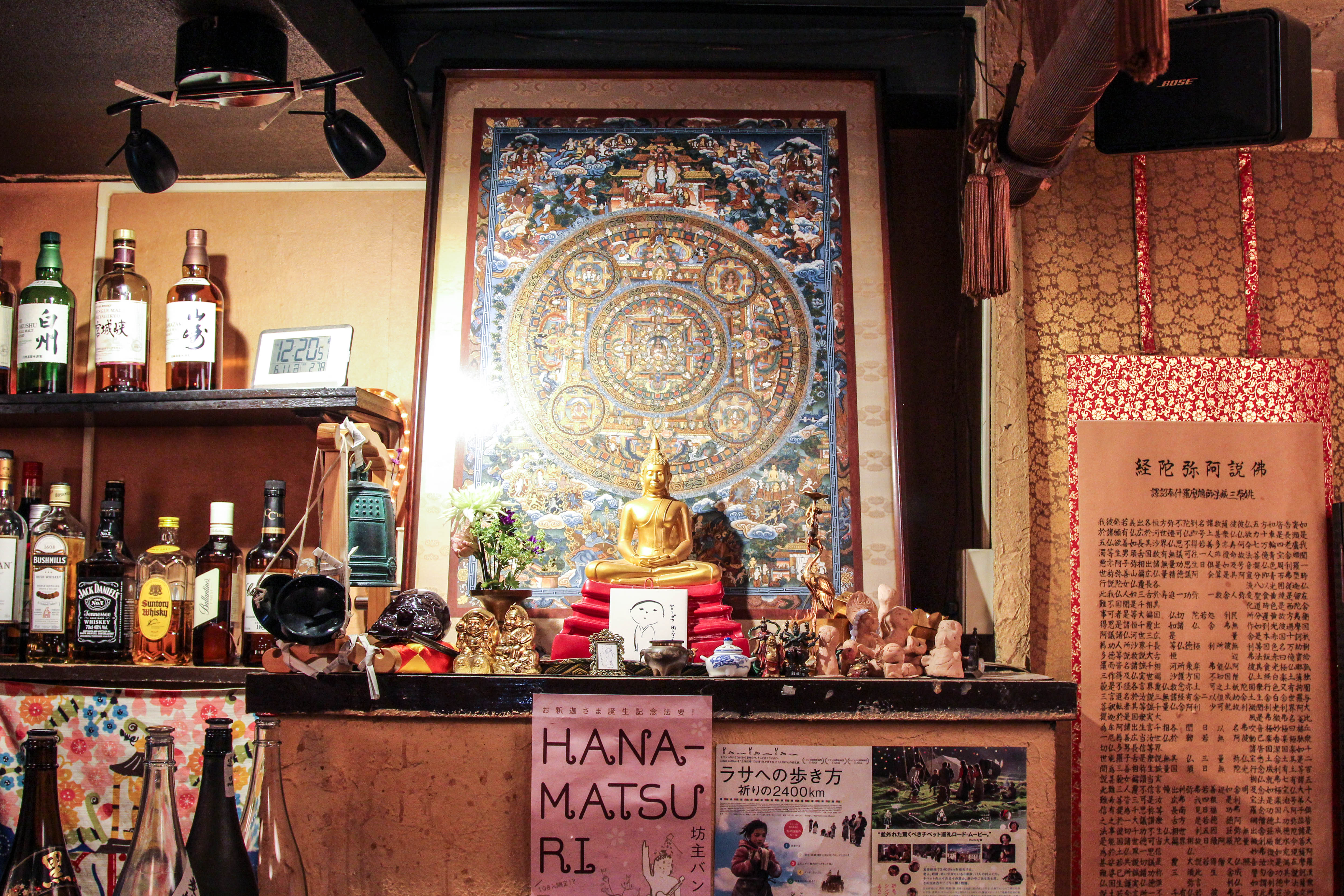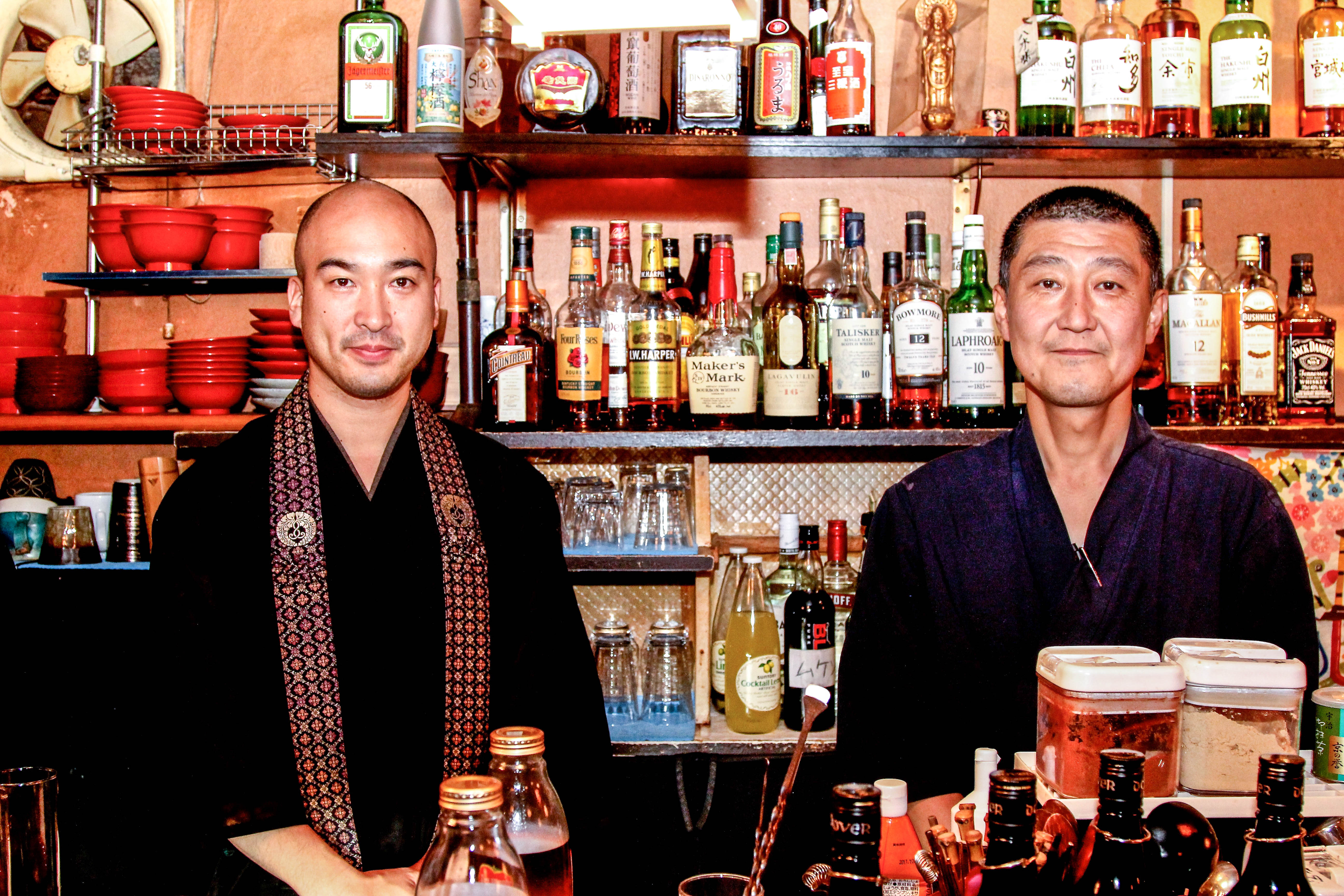“Thank you all for coming. Tonight’s text is translated from the original Sanskrit,” says a middle-aged monk with a warm smile. “My apologies that it is only available in Japanese.”
He stands before a modest Buddhist shrine, his coffee-colored robes plain and his head shorn. After passing out leaflets to a crowd of roughly a dozen, he kneels and begins to chant in a solemn, resonant baritone, inviting others to join. Some do, their song rising in an uncertain echo. I don’t speak Japanese, but I attempt to follow along in a quavery, thin voice. The sound gathers strength, merging with the others and growing steadier and deeper until it trails off and dies down completely. A bell rings and the monk lets the silence sink in for a moment.
Videos by VICE
“Arigatou gozaimashita.”
With that, the hum of conversation returns to the small room and patrons turn their attention back to their drinks. A few more sidle up to the counter, where the very same monk who was chanting a minute ago pours chilled sake with the same gracious smile. I’m not in a Buddhist temple, but rather in a tiny watering hole in Tokyo’s Yotsuya neighborhood. For the past 17 years, Vowz Bar has been serving cocktails with a side of Buddhist philosophy, for those who wish to receive it. Tokyo has no shortage of quirky themed bars and restaurants. Those who feel so inclined can dine in the company of ninjas, drink out of urine syringes in a creepy prison ER ward, get their Twilight on with cocktails like the Blood Clot at the Vampire Café, or watch buxom bikini babes duke it out with cyborgs at the perpetually popular Robot Restaurant. Yet what sets Vowz Bar apart from, say, an owl café in Harajuku or a maid bar in Shibuya, is that this place doesn’t feel like a touristy gimmick. Though the words “monk bar” sound both oxymoronic and rather suspect, the staff of practicing Buddhists are earnest in their mission. Everyone is welcome, but the bar caters more to locals than to curious foreigners.

“These days, young people don’t go to temples anymore,” says Yoshinobu Fujioka, a practicing member of the Jōdo Shinshū sect. One of the earliest members to join, this charismatic man in his 30s has been involved since 2001. “We wanted to spread the teachings of Buddhism to the people, so we started this business.”
For many Buddhists, the idea of drinking alcohol is inherently problematic with the basic tenets of the religion. The fifth precept of Buddhism warns against the ill effects of any intoxicants that might cloud the mind or provide distraction. Yet as with most religions, the specific rules of Buddhism vary widely from sect to sect. Some abstain from sex, booze, and beef, while others allow for a bit more wiggle room. The roughly ten monks connected with the bar at any given time come from different traditions, but all err on the liberal side.
“We have no real hard rules in my sect,” says Fujioka. “Monks can eat meat. We can drink alcohol. We can even get married, if we so choose. Daijoubu desu—it’s OK.”

As a result, while you won’t see too many people drinking themselves into oblivion at Vowz Bar, you will see them sipping on cocktails with names like Mugen-Jigoku (Never-Ending Suffering in Hell) or Gokuraku-Jodo (Nirvana in the Pure Land), as well as homemade herbal liquors and yakushu, or medicinal liquors, infused with soft-shelled turtle or habu snake. Like most bars in Tokyo, you’ll also see guests lighting up cigarettes. For Fujioka and his cohorts, such minor indulgences are fine, as religion need not be an exercise in masochism.
“We want people to remember that Buddhism isn’t just for funerals,” he says. Judging by the multinational mix of patrons choosing to spend their Saturday night listening to prayer, it seems to be working. In fact, the concept has become so popular that it’s spread across Japan. “It tells us how to live easier and how to live properly.”
Fujioka’s idea of living properly leaves plenty of room for fun, in addition to mindfulness. Case in point: He’s one of the only monks you’ll ever meet who moonlights as guitarist and lead vocals in a rock band.
“Vowz Band!” he says enthusiastically when I point to the poster on the wall advertising an upcoming concert. “All of us are in it together. We play a lot of gigs around Tokyo. We want to teach people lessons using our music.”
Their lyrics often feature comical or entertaining references to the teachings of Buddha and sometimes incorporate traditional instruments. Despite the religious element, one would never mistake this for a dirge, and their sound has been known to get the crowds in Shibuya stomping. It’s one more way to spread the word while making it more accessible to a modern, increasingly secular society.

That being said, neither Fujioka nor his brethren have any interest in ramming the message down anyone’s throats. People are always free to come up and ask them questions about anything at the bar. Many guests have spiritual queries or are interested in learning more, while others simply want life advice. A number of women have come to the bar asking for help with their romantic woes. Many of the patrons are simply curious, and a high percentage are non-believers.
“Of course that’s OK,” he reassures me. “Most Japanese people are like that these days. That’s why we’re doing this.”
Several pours of sake later, my friends and I leave feeling rather serene, if not necessarily wiser. It occurs to me that Tokyo might be the only place on Earth where monks jamming at rock concerts and shaking up cocktails don’t seem strange at all. It might not quite fit the conventional image of a shrine, but Vowz Bar nonetheless feels like a welcome refuge in the midst of this city’s surreal nocturnal landscape.
More
From VICE
-

Lalit Patidar -

Screenshot: Sony Interactive Entertainment -

Screenshot: Shaun Cichacki -

Melissa Mercado
